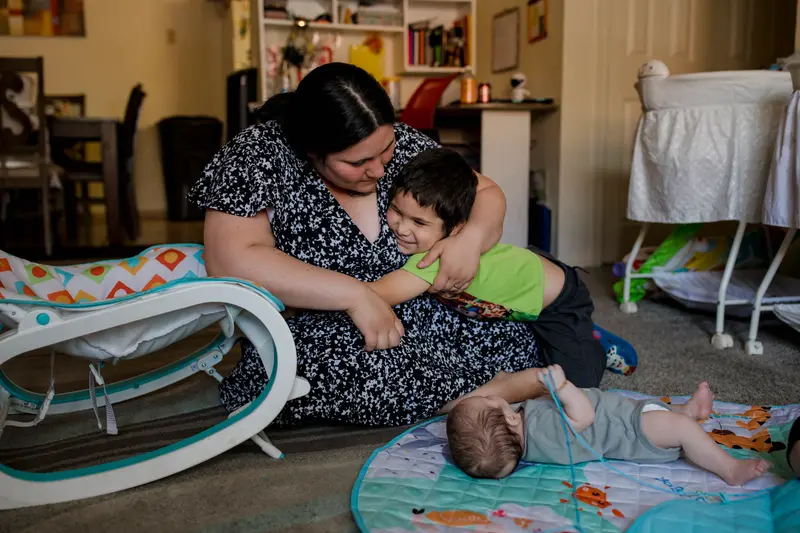Across the Southwest, states are reconsidering how they approach welfare, with several legislatures enacting or considering new laws to ensure that more assistance is made available to low-income families struggling to afford rent, child care, groceries and diapers. The moves follow months of ProPublica reporting on punitive and outdated welfare policies in this part of the country and come amid a yearslong surge in the region’s cost of living.
In New Mexico, Gov. Michelle Lujan Grisham on Wednesday signed into law a budget that will allow an estimated $6.96 million in child support to go directly to children instead of to the government. Until now, the state had intercepted these dollars as reimbursement for the custodial parent previously having received welfare, as ProPublica reported in September.
All of that money will now go to kids in poverty.
In Arizona, lawmakers introduced a bill in February that would, among other provisions, increase the amount of cash assistance available to poor parents and keep adjusting it for inflation going forward. The legislation would also extend the limit — currently the shortest in the nation — on the number of months that these families can receive aid.
Advocates said the potential reforms were directly informed by ProPublica’s reporting on a mom in Phoenix named Arianna Bermudez who was cut off from welfare assistance that she desperately needed to be able to afford child care — only to have welfare funding instead be used to help pay for an investigation of her parenting. (Her son was removed from her care for more than six months, even though she was not accused of of child abuse or neglect.)
And in Colorado, a bill was introduced late last month that would make several similar changes, including removing restrictive barriers to accessing cash aid and increasing monthly payments, in part to reflect how rents and prices have been increasing in that state, as they have been around the Southwest.
The New Mexico policy shift is the most dramatic one, and it has been in the works since last year. Making sure that the child support is actually going to children is an administration initiative, according to Nora Meyers Sackett, the governor’s press secretary.
ProPublica’s investigation of this issue found that single mothers applying for public assistance in New Mexico, which has one of the highest child-poverty rates in the U.S., first have to reveal under penalty of perjury who fathered their kids and the exact date when they got pregnant, among other deeply personal details. The state then uses that information to pursue child support from the dads — and pockets much of the money it collects, sharing a large portion with the federal government.
The 1996 welfare reform law signed by then-President Bill Clinton encouraged states to recoup money spent on public assistance in this way, and most states still do it.
It may take several months for the change to take effect, likely until July, according to Jodi McGinnis Porter, a spokesperson for the New Mexico Human Services Department. The fixes that still need to be made, she said, include updates to the state child support computer system and informing the federal government that the new policy is in place.
Arizona, for its part, has been a national outlier in its punitive approach to applicants for public assistance. Only 6% of families in poverty in the state are able to access cash aid, and if they do get help, the amount — $278 a month for a family of three — is one of the lowest in the country.
That’s partly because, during the Great Recession over a decade ago, Arizona started redirecting the majority of its welfare funding to its Department of Child Safety, which investigates parents and in many cases removes their children. Often those under investigation are poor and could have better supported their kids if provided cash assistance.
But the new legislation, which would aim to increase benefits back to pre-Recession levels, is unlikely to pass the Republican-led, fiscally conservative state Legislature. No lawmakers have explicitly come out against the bill yet, but in the past, efforts to expand government programs for the poor have routinely failed in Arizona.
Meanwhile, Utah Gov. Spencer Cox was asked at a December news conference about the restrictive welfare policies that ProPublica investigated in his state. Our reporting found that the Utah Department of Workforce Services has an agreement with the Church of Jesus Christ of Latter-day Saints to count a percentage of the church’s charitable work as the state’s own welfare spending, as a way of spending less state money on public assistance.
The department does not appear to have proposed any changes to that policy and did not respond to a request for comment.












